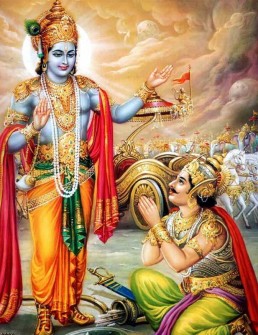Brahma is the first manifestation of the Absolute, Brahman in time and space. He is also known as Prajapati and Viraj.
Day means evolution or projection of the universe. It is the period of cosmic manifestation. Night means cosmic involution or dissolution of the universe. It is the period of non-manifestation. According to the Hindu philosophy time is the measurement of interval between two different experiences.
In a given single experience there is no perception of time just as in one point there is no concept of distance for distances can be measured between two points only.
The worlds are conditioned by time and hence they manifest again and again although the duration of their cycles vary and are very long – each cycle lasting for crores of years (in
terms of our present understanding of 365 days). A thousand such cycles makes a day of Brahma and another such cycle is the night of Brahma. Those who can see and live through the day and night of Brahma can really know what a day is and what a night is meaning thereby that such yogis can visualize many Brahmas arising and disintegrating in the Ocean of great Cause. Thus they do not feel any attachment even to the happiness of the highest heaven, how much less to that of earth.
In this and the following two verses Gita points out the life of the Cosmic Man and his concept of time. It points out the non-distinction between microcosm (vyashti) and macrocosm (samashti).
The God principle (Hiranyagarbha – the source of all objects) is a concept which represents the total mind and intellect of all the living creatures living at any given point of time in the world. To understand the ways of the mind projecting the world of its own objects is to understand not only the all powerful nature but also the limitations of God- principle as conceived to be a Creator, Sustainer and Annihilator. Sri Krishna brings out this subtle idea clearly in the mind of Arjuna in these three verses.
WHAT HAPPENS DURING BRAHMA’S DAY AND NIGHT?

